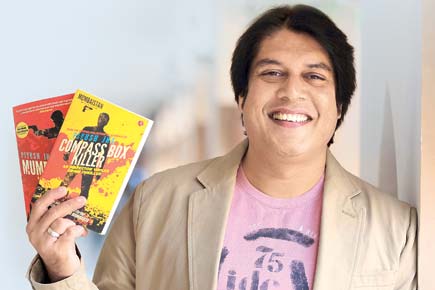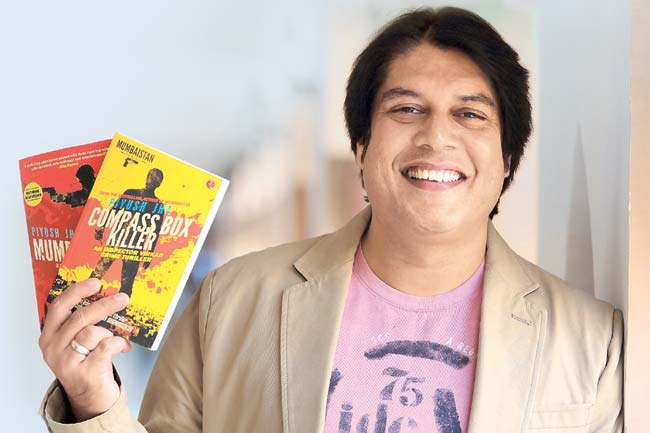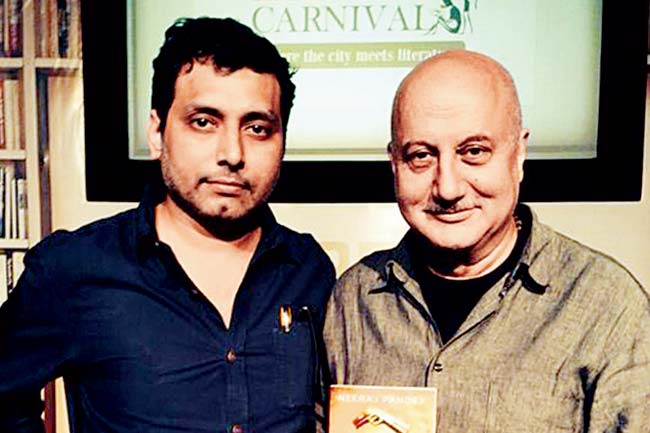In the last 30 days, at least two filmmakers have turned novelists and published their books. The next few months, hold greater promise with several others getting ready to get their books published

“Twenty years ago, my father-in-law Vijay Tendulkar used to prod me to write books,” recalls filmmaker Karan Razdan. Tendulkar, the famous playwright, would even ask Razdan to write his movie scripts in a novel form, so that he gets more material about his characters, their relationships and events. “I told him it’s too cumbersome and I just don’t have the time,” he smiles. But that was then. In November 2013, Razdan, who directed the hit TV series Rajani in the 1980s and films such as Souten and Girlfriend, came out with his first novel Tantra and the Tantrika. But that wasn’t the end of it. The filmmaker has already sent his second book The Power of Blessing, for publishing, which should be out next month. The third — Timeless – A dive into Shiva is in the process of being edited. “As you grow older, you realise the wisdom of elders,” smiles Razdan, “Writing books has become an addiction now. I can’t seem to stop myself from writing more of them.”
ADVERTISEMENT

Following the success of his previous book Compass Box Killer in which he introduced the character of Inspector Veerkar, filmmaker Piyush Jha’s next novel takes the adventures of Veerkar a step ahead
Razdan is certainly not the first or the last filmmaker to have written a book. The year 2012 saw Piyush Jha, director of films such as King of Bollywood and Sikandar, bring out his first book Mumbaistan, a collection of three crime thrillers, as part of a three book deal with Rupa Publications. His second novel Compass Box Killer was out in July, last year, while the last in the series is expected to come out in May this year. Scandal Point, a social satire by Fahad Samar, came out in September last year and became a bestseller within a few weeks of its launch. In December last year, Neeraj Pandey of A Wednesday and Special 26 fame, released his debut novel Ghalib Danger. The same month, screenplay writer Vibha Singh’s thriller A Convenient Culprit was launched by actor Kangana Ranaut. What’s more, the coming few months seem all set to welcome many more to the filmmakers-turned-authors club. While director Sanjay Gupta is penning a book of short stories which might be out by next year, we hear filmmaker and screenplay writer Rensil D’Silva too is in the process of bringing out his novel by next month. You are bound to ask, why write books when these filmmakers have the platform of writing for their films anyway? So did we.

It took 11 years for actor-turned-filmmaker Karan Razdan to research and write his debut novel Tantra and the Tantrika. Subhash Ghai launched his book in November last year
On a book trail
“There is no greater agony than bearing an untold story inside you.” American author and poet Maya Angelou may have uttered that sentence in a different context, but it may as well serve as an apt description of the phenomenon that’s bitten the film fraternity. “I’m a voracious reader and I have always wanted to write,” says filmmaker Sanjay Gupta, who adds that while a director may have many stories in his head, they may not always lend themselves to the big screen. Gupta, who’s known for his dark, edgy films has decided to move away from the genre in recent times. “But I still have a dark side and I want to give them an outlet through my short stories,” he says.

Vibha Singh describes her novel A Convenient Culprit as a tribute to the media. Seen here with Kangana Ranaut at the launch of the book
Having written stories, dialogues and lyrics for over 15 films such as Parineeta and Aap Ka Suroor and 10 television shows, Vibha Singh, who turned author with A Convenient Culprit, says that the three mediums have their own requirements and target audience. “TV writing is more simplistic, but there needs to be what’s called a ‘hook’ everyday, so it’s tough writing in that sense. In films, you have the challenge of keeping the audience engaged for those two or three hours. A book allows you to be more complex. It allows you to put down your thoughts in a certain way that can go beyond a character. The story needs to have a rich tapestry. A book is the perfect medium for someone who really wants to write a story,” adds Singh, who is currently working on a medical thriller and an international thriller.

For Neeraj Pandey, director of films like A Wednesday and Special 26, writing a book was on the to-do list. Seen here at the launch of Ghalib Danger with actor Anupam Kher
To adapt or not
While it is true that these filmmakers have been bitten by the writing bug, it is also difficult to ignore the fact that they are filmmakers first. And so, it would not be wrong to suggest that many of them wrote these books, hoping to adapt them into screenplays for movies later. Neeraj Pandey admits that as a filmmaker, he can’t thinking in a certain way, but also makes it clear that he wasn’t writing a script while penning down his gangster saga Ghalib Danger. “If I were to directly make a screenplay, I would have had to leave out a lot of things. The idea was to give it a shot as a complete story and as and when a film has to be made out of it, that part will be culled out,” he says.

The first draft of Fahad Samar’s second novel Flashpoint is ready. He hopes to have it out later this year
And although the rewards for being appreciated for a novel are just as gratifying, Fahad Samar is of the opinion that the book being adapted into a screenplay would be the logical conclusion of an endeavour such as this. All this certainly makes sense, when you think of the readers as testing ground for what they may or may not like. Piyush Jha, whose first book Mumbaistan is all set to be converted into a TV series and the second, Compass Box Killer into a movie, says there was no initial plan to adapt the books, but the overwhelming response to his work gave him the idea. “Initially, I was just looking for another outlet to do something creative, but when the books became bestsellers, I started exploring the idea of adapting them for the big screen,” says Jha.
The ‘write’ time
At a time when Indian authors writing in English, such as Chetan Bhagat, Amish Tripathi and Ashwin Sanghi have become household names, it certainly seems like an opportune time to come out with books. “People say that readership has gone down and that’s true for literary fiction. But readership for popular fiction is going up,” says Jha, who believes it’s a great time for authors to write in all kinds of genres. “The first wave came with authors like Chetan Bhagat who wrote college literature, then came chick lit and now, the doors are open for all kinds of genres ranging from crime fiction to thrillers to horror to romance. These genres existed elsewhere in the world but they were almost absent from Indian English writing,” he adds.
According to Samar, there is a market for all kinds of writing now. “It’s an exciting time to make films or to write books. These are all different ways of creative expression where a new generation of people are expressing themselves in different media,” he says. While pointing out that authors like Chetan Bhagat and Amish Tripathi have actively opened up the space for adapting books into films, Singh makes an interesting observation. “It is these gentlemen whose books were starting to get adapted into films that have opened up this possible reverse trend. I was offered to write a book, so maybe people who write films are also being looked upon as possible serious book writers,” she suggests.

Rensil D’Silva’s first novel is expected to be out next month
Moolah doesn’t matter
While writing a book is not exactly a lucrative process, unless you’re in the top league of authors, it is definitely less when you compare it with writing a movie script. But the filmmakers insist that it is not always the moolah they are after. “You don’t always do things for money,” says Samar, “There comes a stage in life, when creative satisfaction matters more than money, otherwise, nobody would write books.” Gupta concurs with him. “If I spend the same amount of time writing a film script, that I would for a book, the returns would be a 100 times over. Writing a book can only come out of passion,” he adds. Like we said, Maya Angelou was pretty much on the right track when she made that statement.
 Subscribe today by clicking the link and stay updated with the latest news!" Click here!
Subscribe today by clicking the link and stay updated with the latest news!" Click here!






